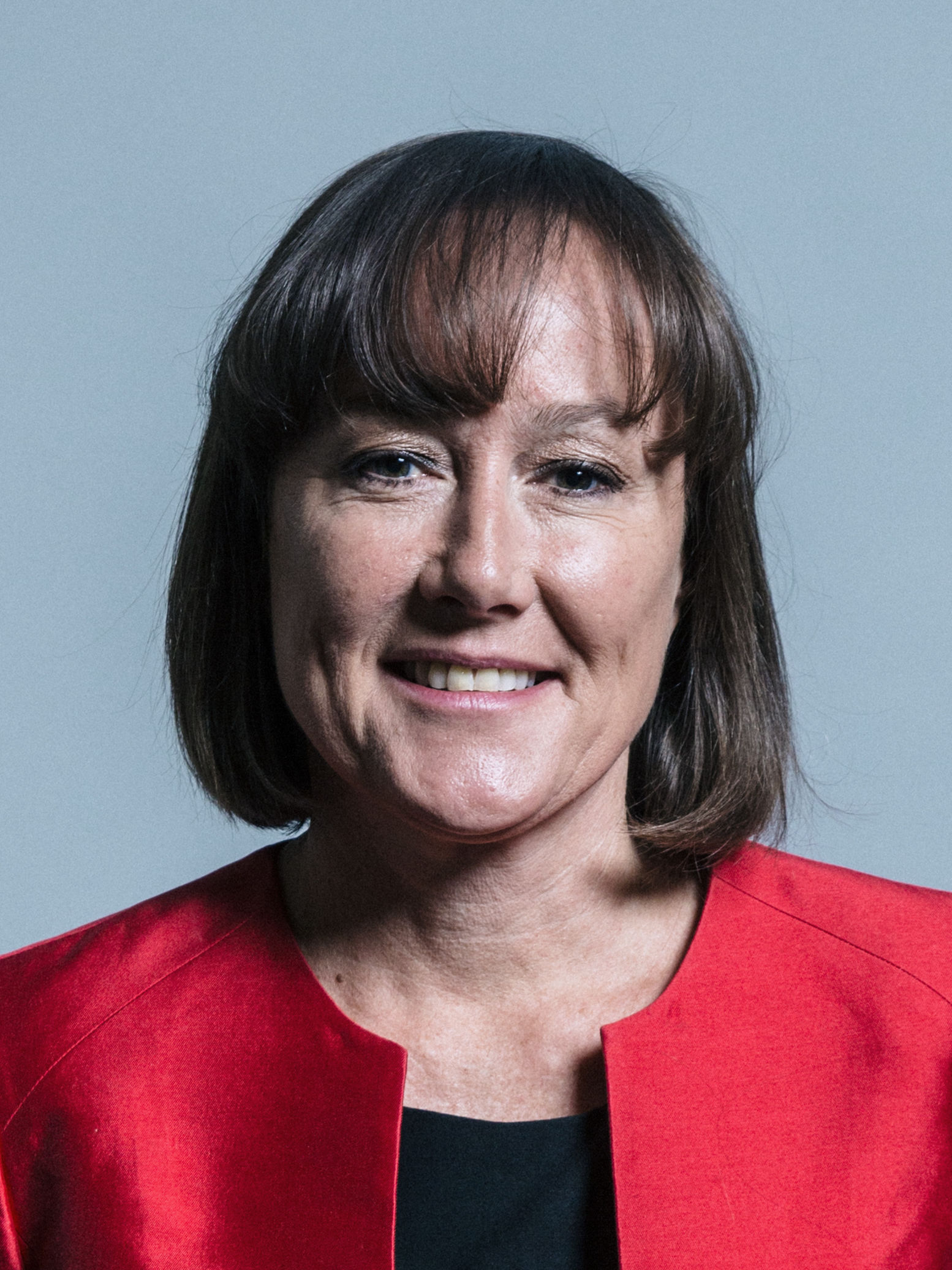Wales Office
The Office of the Secretary of State for Wales supports the Welsh Secretary and the Parliamentary Under Secretaries of State in promoting the best interests of Wales within a stronger United Kingdom. It ensures Welsh interests are represented at the heart of the UK Government and the UK Government’s responsibilities are represented in Wales.
Secretary of State

Jo Stevens
Secretary of State for Wales

Baroness Anderson of Stoke-on-Trent
Lords Spokesperson (Wales Office)
Shadow Ministers / Spokeperson
Liberal Democrat
Baroness Humphreys (LD - Life peer)Liberal Democrat Lords Spokesperson (Wales)
David Chadwick (LD - Brecon, Radnor and Cwm Tawe)
Liberal Democrat Spokesperson (Wales)
Conservative
Mims Davies (Con - East Grinstead and Uckfield)Shadow Secretary of State for Wales
Junior Shadow Ministers / Deputy Spokesperson
Conservative
Baroness Bloomfield of Hinton Waldrist (Con - Life peer)Shadow Minister (Wales)
Parliamentary Under-Secretaries of State
Anna McMorrin (Lab - Cardiff North)Parliamentary Under-Secretary (Wales Office)
Claire Hughes (Lab - Bangor Aberconwy)
Parliamentary Under-Secretary (Wales Office)
17:00
Wales has a long tradition of farming, and the sector is integral to the Welsh economy. In 2022, agriculture, fishing …
To ask the Secretary of State for Wales, what proportion of (a) named day questions and (b) ordinary written questions …
A Bill to amend the Government of Wales Act 2006 and the Wales Act 2014 and to make provision about …
16:54
Wales Office Commons Appearances
Oral Answers to Questions is a regularly scheduled appearance where the Secretary of State and junior minister will answer at the Dispatch Box questions from backbench MPs
Other Commons Chamber appearances can be:- Urgent Questions where the Speaker has selected a question to which a Minister must reply that day
- Adjornment Debates a 30 minute debate attended by a Minister that concludes the day in Parliament.
- Oral Statements informing the Commons of a significant development, where backbench MP's can then question the Minister making the statement.
Westminster Hall debates are performed in response to backbench MPs or e-petitions asking for a Minister to address a detailed issue
Written Statements are made when a current event is not sufficiently significant to require an Oral Statement, but the House is required to be informed.
Bills currently before Parliament
Wales Office does not have Bills currently before Parliament
Acts of Parliament created in the 2024 Parliament
Wales Office has not passed any Acts during the 2024 Parliament
Petitions
e-Petitions are administered by Parliament and allow members of the public to express support for a particular issue.
If an e-petition reaches 10,000 signatures the Government will issue a written response.
If an e-petition reaches 100,000 signatures the petition becomes eligible for a Parliamentary debate (usually Monday 4.30pm in Westminster Hall).
(10 in the last 7 days)
(10 in the last 7 days)
Departmental Select Committee
Welsh Affairs Committee
Commons Select Committees are a formally established cross-party group of backbench MPs tasked with holding a Government department to account.
At any time there will be number of ongoing investigations into the work of the Department, or issues which fall within the oversight of the Department. Witnesses can be summoned from within the Government and outside to assist in these inquiries.
Select Committee findings are reported to the Commons, printed, and published on the Parliament website. The government then usually has 60 days to reply to the committee's recommendations.
11 Members of the Welsh Affairs Committee

Welsh Affairs Committee Member since 9th September 2024

Welsh Affairs Committee Member since 28th October 2024

Welsh Affairs Committee Member since 28th October 2024

Welsh Affairs Committee Member since 28th October 2024

Welsh Affairs Committee Member since 28th October 2024

Welsh Affairs Committee Member since 28th October 2024

Welsh Affairs Committee Member since 28th October 2024

Welsh Affairs Committee Member since 4th November 2024

Welsh Affairs Committee Member since 6th January 2025

Welsh Affairs Committee Member since 13th January 2025

Welsh Affairs Committee Member since 17th November 2025
Welsh Affairs Committee: 5 Current Inquiries
Welsh Affairs Committee: Previous Inquiries
50 most recent Written Questions
(View all written questions)The Government recognises the importance of the effective and timely handling of written parliamentary questions (PQs).
The Wales Office answered 100% of Ordinary Written and Named Day questions within the required timescales between May 2025 and November 2025.
The House of Commons Procedure Committee monitors departmental PQ performance and publishes a report of the government’s consolidated PQ data following the end of each session.
Secretary of State for Wales
There are currently no direct ministerial appointments at the Wales Office.
Secretary of State for Wales
The UK Government has regular discussions with the Welsh Government on a range of issues, including the Welsh Government’s project to establish a public sector laboratory for the supply of medical radioisotopes at the Trawsfynydd site in Gwynedd.
The UK Government continues to engage with the Welsh Government on the opportunities this proposal could create for Wales.
Baroness in Waiting (HM Household) (Whip)
The Barnett formula has been applied in the normal way to changes in UK Government Departmental Expenditure Limit (DEL). Spending Review 2025 provided the Welsh Government with their largest spending review settlements in real terms since devolution. As a result of decisions at Budget 2025, the Welsh Government will receive an additional £320 million RDELex and £185 million CDEL through the operation of the Barnett formula on top of these record settlements. This means the Welsh Government’s settlement continues to grow in real terms between 2024-25 and 2028-29.
Tackling child poverty is at the heart of this government’s mission to break down barriers to opportunity and give every child the best start in life. The Government is investing in the future of our children and introducing a fundamental change by removing the two-child limit on Universal Credit, benefitting 69,000 children in Wales. This comes alongside a package of measures that will drive down working poverty by raising the minimum wage, creating more secure jobs by strengthening rights at work.
The Strategy builds on the reform plans already underway across government and the important work underway in Welsh Government. We are committed to continued collaboration with the Welsh Government to tackle child poverty across Wales, particularly through the implementation phase that will now follow.
Secretary of State for Wales
Liam Byrne
(Labour - Birmingham Hodge Hill and Solihull North)
The Wales Office Capital Departmental Expenditure Limit (DEL) over the Spending Review is shown below:
Financial Year | £Million |
2025/26 | 0.975* |
2026/27 | 0.030 |
2027/28 | 0.030 |
2028/29 | 0.030 |
The Department does not have capital programmes. The capital DEL is to cover the purchase of office equipment.
*The 2025-26 Capital DEL includes £0.945m for a change in valuation of the Departments building leases resulting from a technical accounting adjustment to comply with HM Treasury Consolidated Budgeting guidance.
Secretary of State for Wales
Through the Pride in Place Programme, nine more communities in Wales will receive up to £20 million each over the next 10 years. Every local authority in Wales will also receive a share of £34.5 million through the Pride in Place Impact Fund. This £214 million investment will support communities to drive forward the changes they want to see and will deliver visible improvements to drive growth, break down barriers to opportunity, and restore pride and confidence in local areas.
The nine local authorities in Wales receiving funding under the Pride in Place Programme are currently in the process of identifying the places within their area that will serve as the focus for this investment. This process combines objective data on local need with engagement from the local community and strategic alignment with other investments such as the Welsh Government’s Transforming Towns Programme and other placemaking plans. The selected places will be confirmed early in the new year.
Secretary of State for Wales
In the last financial year, the Office spent no money on LinkedIn membership fees and £3,332.48 on other subscriptions.
Secretary of State for Wales
I saw first-hand the devastating impact of Storm Claudia in Monmouthshire when I visited on 20 November with my hon. Friend. My thoughts, and I’m sure those of the whole house, remain with affected residents.
I went to Monmouth to thank emergency responders and local residents who have all rallied together to support the community, and the Mayor of Monmouth, Jacqui Atkin who has raised a substantial sum to help with the clean-up operation.
Both the Welsh and UK Governments will do whatever it takes to support the people and businesses of Monmouthshire to recover in the weeks and months ahead.
Secretary of State for Wales
This Government has chosen Wylfa as the best site to host Britain’s first ever three Small Modular Reactors.
Great British Energy-Nuclear has confirmed it could host up to eight SMR units in the future, bringing in even more jobs, investment and benefits for Wales.
Parliamentary Under-Secretary (Wales Office)
I have discussions with the Secretary of State for Work and Pensions on a regular basis and on a range of issues. My officials work closely with DWP, MHCLG and other departments, including regarding Local Housing Allowance (LHA).
The Government is taking action to support low-income households, including removing the two-child limit to reduce child poverty, benefitting 69,000 children in Wales. In addition, we are increasing the National Living Wage and the National Minimum Wage building on April 2025 increases that already helped up to 160,000 workers in Wales, cutting household energy bills by £150 per year and uprating the Universal Credit Standard Allowance by over 6%. This is the first ever sustained real terms increase in the Standard Allowance, directly benefitting 320,000 households in Wales.
Discretionary Housing Payments are available from local authorities for those who face a shortfall in meeting their housing costs and need further support.
Secretary of State for Wales
The UK Government takes any attempts to intervene in democratic processes very seriously. It is, and always will be, an absolute priority to protect our democratic and electoral processes, including from foreign interference.
The Government addresses these challenges through coordinated efforts led by the Defending Democracy Taskforce and Joint Election Security and Preparedness (JESP) Unit which monitor and mitigate election security risks, including foreign interference. JESP maintains regular contact with representatives from Whitehall departments, law enforcement and intelligence agencies, as well as the devolved governments. JESP continues to lead cross-government efforts in preparation and readiness for the 2026 elections, including those to the Senedd Cymru.
Secretary of State for Wales
David Chadwick
(Liberal Democrat - Brecon, Radnor and Cwm Tawe)
As announced at the Spending Review, from 2026-27 the UK government will provide targeted, long-term local growth funding to support regional growth across the UK, completing the transition from the UK Shared Prosperity Fund (UKSPF). For the next three years, this funding will be at the same overall level in cash terms as under UKSPF in the current year in Wales.
My Department has been provided with the financial breakdown for the new Local Growth Fund, including the capital and revenue split. I have regular discussions with both UK and Welsh Government ministerial colleagues on how this funding will benefit communities the length and breadth of Wales.
Over the course of the Spending Review period, the Local Growth Fund will invest in a range of projects that drive growth through both capital and revenue funding – from infrastructure to supporting businesses and helping people find jobs and acquire new skills.
The Welsh Government is developing an Investment Plan for the Local Growth Fund in Wales, and there is currently a live consultation to inform priorities. Insights from the consultation exercise alongside learning from evaluations of previous programmes will help ensure that the Local Growth Fund delivers long-term, sustainable benefits for communities and complements other major programmes such as Pride in Place, City and Regional Growth Deals, Freeports and Investment Zones.
This new fund reinforces the strong collaborative relationship between the UK Government and Welsh Government. It will help create jobs and grow productivity, bringing benefit to every part of Wales. I am fully committed to ensuring that the transition to the new Local Growth Fund is as smooth as possible with sufficient flexibilities for local authorities to manage the change in capital and revenue funding. To this end, I have written a joint letter with Rebecca Evans MS, Welsh Government Cabinet Secretary for Economy and Planning to local authority leaders in Wales reassuring them that both governments are open to exploring opportunities for additional flexibilities within the parameters of the budget settlement and our shared responsibilities for managing public money. This will help local authorities manage the change while continuing to support local businesses and workers.
Secretary of State for Wales
David Chadwick
(Liberal Democrat - Brecon, Radnor and Cwm Tawe)
As announced at the Spending Review, from 2026-27 the UK government will provide targeted, long-term local growth funding to support regional growth across the UK, completing the transition from the UK Shared Prosperity Fund (UKSPF). For the next three years, this funding will be at the same overall level in cash terms as under UKSPF in the current year in Wales.
My Department has been provided with the financial breakdown for the new Local Growth Fund, including the capital and revenue split. I have regular discussions with both UK and Welsh Government ministerial colleagues on how this funding will benefit communities the length and breadth of Wales.
Over the course of the Spending Review period, the Local Growth Fund will invest in a range of projects that drive growth through both capital and revenue funding – from infrastructure to supporting businesses and helping people find jobs and acquire new skills.
The Welsh Government is developing an Investment Plan for the Local Growth Fund in Wales, and there is currently a live consultation to inform priorities. Insights from the consultation exercise alongside learning from evaluations of previous programmes will help ensure that the Local Growth Fund delivers long-term, sustainable benefits for communities and complements other major programmes such as Pride in Place, City and Regional Growth Deals, Freeports and Investment Zones.
This new fund reinforces the strong collaborative relationship between the UK Government and Welsh Government. It will help create jobs and grow productivity, bringing benefit to every part of Wales. I am fully committed to ensuring that the transition to the new Local Growth Fund is as smooth as possible with sufficient flexibilities for local authorities to manage the change in capital and revenue funding. To this end, I have written a joint letter with Rebecca Evans MS, Welsh Government Cabinet Secretary for Economy and Planning to local authority leaders in Wales reassuring them that both governments are open to exploring opportunities for additional flexibilities within the parameters of the budget settlement and our shared responsibilities for managing public money. This will help local authorities manage the change while continuing to support local businesses and workers.
Secretary of State for Wales
David Chadwick
(Liberal Democrat - Brecon, Radnor and Cwm Tawe)
As announced at the Spending Review, from 2026-27 the UK government will provide targeted, long-term local growth funding to support regional growth across the UK, completing the transition from the UK Shared Prosperity Fund (UKSPF). For the next three years, this funding will be at the same overall level in cash terms as under UKSPF in the current year in Wales.
My Department has been provided with the financial breakdown for the new Local Growth Fund, including the capital and revenue split. I have regular discussions with both UK and Welsh Government ministerial colleagues on how this funding will benefit communities the length and breadth of Wales.
Over the course of the Spending Review period, the Local Growth Fund will invest in a range of projects that drive growth through both capital and revenue funding – from infrastructure to supporting businesses and helping people find jobs and acquire new skills.
The Welsh Government is developing an Investment Plan for the Local Growth Fund in Wales, and there is currently a live consultation to inform priorities. Insights from the consultation exercise alongside learning from evaluations of previous programmes will help ensure that the Local Growth Fund delivers long-term, sustainable benefits for communities and complements other major programmes such as Pride in Place, City and Regional Growth Deals, Freeports and Investment Zones.
This new fund reinforces the strong collaborative relationship between the UK Government and Welsh Government. It will help create jobs and grow productivity, bringing benefit to every part of Wales. I am fully committed to ensuring that the transition to the new Local Growth Fund is as smooth as possible with sufficient flexibilities for local authorities to manage the change in capital and revenue funding. To this end, I have written a joint letter with Rebecca Evans MS, Welsh Government Cabinet Secretary for Economy and Planning to local authority leaders in Wales reassuring them that both governments are open to exploring opportunities for additional flexibilities within the parameters of the budget settlement and our shared responsibilities for managing public money. This will help local authorities manage the change while continuing to support local businesses and workers.
Secretary of State for Wales
As announced at the Spending Review, from 2026-27 the UK government will provide targeted, long-term local growth funding to support regional growth across the UK, completing the transition from the UK Shared Prosperity Fund (UKSPF). For the next three years, this funding will be at the same overall level in cash terms as under UKSPF in the current year in Wales.
My Department has been provided with the financial breakdown for the new Local Growth Fund, including the capital and revenue split. I have regular discussions with both UK and Welsh Government ministerial colleagues on how this funding will benefit communities the length and breadth of Wales.
Over the course of the Spending Review period, the Local Growth Fund will invest in a range of projects that drive growth through both capital and revenue funding – from infrastructure to supporting businesses and helping people find jobs and acquire new skills.
The Welsh Government is developing an Investment Plan for the Local Growth Fund in Wales, and there is currently a live consultation to inform priorities. Insights from the consultation exercise alongside learning from evaluations of previous programmes will help ensure that the Local Growth Fund delivers long-term, sustainable benefits for communities and complements other major programmes such as Pride in Place, City and Regional Growth Deals, Freeports and Investment Zones.
This new fund reinforces the strong collaborative relationship between the UK Government and Welsh Government. It will help create jobs and grow productivity, bringing benefit to every part of Wales. I am fully committed to ensuring that the transition to the new Local Growth Fund is as smooth as possible with sufficient flexibilities for local authorities to manage the change in capital and revenue funding. To this end, I have written a joint letter with Rebecca Evans MS, Welsh Government Cabinet Secretary for Economy and Planning to local authority leaders in Wales reassuring them that both governments are open to exploring opportunities for additional flexibilities within the parameters of the budget settlement and our shared responsibilities for managing public money. This will help local authorities manage the change while continuing to support local businesses and workers.
Secretary of State for Wales
David Chadwick
(Liberal Democrat - Brecon, Radnor and Cwm Tawe)
As announced at the Spending Review, from 2026-27 the UK government will provide targeted, long-term local growth funding to support regional growth across the UK, completing the transition from the UK Shared Prosperity Fund (UKSPF). For the next three years, this funding will be at the same overall level in cash terms as under UKSPF in the current year in Wales.
My Department has been provided with the financial breakdown for the new Local Growth Fund, including the capital and revenue split. I have regular discussions with both UK and Welsh Government ministerial colleagues on how this funding will benefit communities the length and breadth of Wales.
Over the course of the Spending Review period, the Local Growth Fund will invest in a range of projects that drive growth through both capital and revenue funding – from infrastructure to supporting businesses and helping people find jobs and acquire new skills.
The Welsh Government is developing an Investment Plan for the Local Growth Fund in Wales, and there is currently a live consultation to inform priorities. Insights from the consultation exercise alongside learning from evaluations of previous programmes will help ensure that the Local Growth Fund delivers long-term, sustainable benefits for communities and complements other major programmes such as Pride in Place, City and Regional Growth Deals, Freeports and Investment Zones.
This new fund reinforces the strong collaborative relationship between the UK Government and Welsh Government. It will help create jobs and grow productivity, bringing benefit to every part of Wales. I am fully committed to ensuring that the transition to the new Local Growth Fund is as smooth as possible with sufficient flexibilities for local authorities to manage the change in capital and revenue funding. To this end, I have written a joint letter with Rebecca Evans MS, Welsh Government Cabinet Secretary for Economy and Planning to local authority leaders in Wales reassuring them that both governments are open to exploring opportunities for additional flexibilities within the parameters of the budget settlement and our shared responsibilities for managing public money. This will help local authorities manage the change while continuing to support local businesses and workers.
Secretary of State for Wales
As announced at the Spending Review, from 2026-27 the UK government will provide targeted, long-term local growth funding to support regional growth across the UK, completing the transition from the UK Shared Prosperity Fund (UKSPF). For the next three years, this funding will be at the same overall level in cash terms as under UKSPF in the current year in Wales.
My Department has been provided with the financial breakdown for the new Local Growth Fund, including the capital and revenue split. I have regular discussions with both UK and Welsh Government ministerial colleagues on how this funding will benefit communities the length and breadth of Wales.
Over the course of the Spending Review period, the Local Growth Fund will invest in a range of projects that drive growth through both capital and revenue funding – from infrastructure to supporting businesses and helping people find jobs and acquire new skills.
The Welsh Government is developing an Investment Plan for the Local Growth Fund in Wales, and there is currently a live consultation to inform priorities. Insights from the consultation exercise alongside learning from evaluations of previous programmes will help ensure that the Local Growth Fund delivers long-term, sustainable benefits for communities and complements other major programmes such as Pride in Place, City and Regional Growth Deals, Freeports and Investment Zones.
This new fund reinforces the strong collaborative relationship between the UK Government and Welsh Government. It will help create jobs and grow productivity, bringing benefit to every part of Wales. I am fully committed to ensuring that the transition to the new Local Growth Fund is as smooth as possible with sufficient flexibilities for local authorities to manage the change in capital and revenue funding. To this end, I have written a joint letter with Rebecca Evans MS, Welsh Government Cabinet Secretary for Economy and Planning to local authority leaders in Wales reassuring them that both governments are open to exploring opportunities for additional flexibilities within the parameters of the budget settlement and our shared responsibilities for managing public money. This will help local authorities manage the change while continuing to support local businesses and workers.
Secretary of State for Wales
As the lead department, the Home Office leads on engagement with victims and survivors of grooming gangs across Wales and England. On 16 June 2025, the then Home Secretary made a statement to Parliament confirming that the Government has accepted all of the recommendations made in Baroness Casey’s national audit on group-based child sexual exploitation and abuse, including a recommendation to commission a national inquiry.
Baroness Casey specifically recommended that the national police operation and national inquiry should cover England and Wales. The Home Office has been working closely with partners to develop the Terms of Reference for the Inquiry, with early consultation already undertaken with victims and survivors. The National Working Group (NWG) charity has been coordinating the engagement with victims and survivors related to the inquiry set-up, including sessions attended by the Minister for Safeguarding and VAWG.
Secretary of State for Wales
The Ministry of Justice (MoJ) provides employment services, including policies, to staff and line managers in my department.
Staff and line managers in my Department can access domestic abuse guidance and support which provides important information on how to best respond to anyone experiencing or who is a survivor of domestic abuse.
Secretary of State for Wales
The Department's main Whitehall building, Gwydyr House has 4 single sex and 2 non-gendered universal toilets (individual self-contained lockable toilet rooms which contain a toilet, washbasin and hand-drying facilities). This is in addition to 1 wheelchair accessible toilet.
Secretary of State for Wales
Both the UK and Welsh Governments know how important it is to strengthen our NHS and bring down waiting lists. That is why our two governments are working together in the spirit of genuine collaboration and partnership to do everything possible to cut waiting lists, collaborate and learn from each other.
That partnership begins with how the NHS is funded. At the Spending Review, we announced a record £22.4 billion per year on average for the Welsh Government between 2026-27 and 2028-29, to invest in public services and drive down waiting lists. This is the largest budget settlement in the history of devolution. This builds on what was announced at Autumn Budget which provided the Welsh Government with an additional £1.7 billion to invest in public services like the NHS. An extra £600 million in funding was invested by the Welsh Government for health and social care in their Budget for 2025/26. The record settlement we provided to the Welsh Government has helped to reduce NHS waiting lists and I was pleased to see that in the most recent health statistics that the over two years waiting lists are more than three quarters (87.6%) lower than the peak in March 2022.
Our governments are learning from each other by sharing best practice on health. The UK Government has learned from the Welsh Government’s reform to dentistry and GP practices, as the UK Government has shared its approach to rolling out extra elective capacity, including through new surgical hubs – an approach the Welsh Government is also taking.
A good example of our two Governments working together on health is the Interministerial Group (IMG) for Health and Social Care, which met on 25 September, chaired by the Parliamentary Under-Secretary of State at the Department of Health & Social Care (DHSC). The IMG brought together Ministers from DHSC and the Devolved Governments to discuss shared priorities across health in the UK, including innovation and elective recovery. There are also regular meetings between officials in UK Government and the Devolved Governments on a range health and social care matters.
Our two Governments are working together on ‘Exercise PEGASUS’ – a national exercise on the United Kingdom’s preparedness for a pandemic. This was the first of its kind in nearly a decade and the biggest in UK history.
There are long-standing arrangements for cancer care, renal services and mental health support that cross the border seamlessly. Furthermore, NHS England is working with NHS Wales to improve digital interoperability, especially through the shared care record and technical collaboration on the fast healthcare interoperability resources which allows systems from different manufacturers to exchange messages and data, regardless of the setting that care is delivered in.
In October, the chief information officers across governments agreed to begin working together on digital architecture and standards. This is intended to improve how the NHS across the border can share systems, standards and communicate more effectively. This partnership aims to improve the sharing of digital records in the short term and eventually to achieve a single patient record.
Around 30,000 people who live in England have a GP in Wales, and vice versa. That is why NHS Wales and NHS England have a Statement of Values and Principles that underpins the arrangements for treatment for patients living on the Wales England border. This supports better patient outcomes and avoids fragmentation of care for those people living either side of the border. Further detail on the statement is in the link below.
Secretary of State for Wales
Both the UK and Welsh Governments know how important it is to strengthen our NHS and bring down waiting lists. That is why our two governments are working together in the spirit of genuine collaboration and partnership to do everything possible to cut waiting lists, collaborate and learn from each other.
That partnership begins with how the NHS is funded. At the Spending Review, we announced a record £22.4 billion per year on average for the Welsh Government between 2026-27 and 2028-29, to invest in public services and drive down waiting lists. This is the largest budget settlement in the history of devolution. This builds on what was announced at Autumn Budget which provided the Welsh Government with an additional £1.7 billion to invest in public services like the NHS. An extra £600 million in funding was invested by the Welsh Government for health and social care in their Budget for 2025/26. The record settlement we provided to the Welsh Government has helped to reduce NHS waiting lists and I was pleased to see that in the most recent health statistics that the over two years waiting lists are more than three quarters (87.6%) lower than the peak in March 2022.
Our governments are learning from each other by sharing best practice on health. The UK Government has learned from the Welsh Government’s reform to dentistry and GP practices, as the UK Government has shared its approach to rolling out extra elective capacity, including through new surgical hubs – an approach the Welsh Government is also taking.
A good example of our two Governments working together on health is the Interministerial Group (IMG) for Health and Social Care, which met on 25 September, chaired by the Parliamentary Under-Secretary of State at the Department of Health & Social Care (DHSC). The IMG brought together Ministers from DHSC and the Devolved Governments to discuss shared priorities across health in the UK, including innovation and elective recovery. There are also regular meetings between officials in UK Government and the Devolved Governments on a range health and social care matters.
Our two Governments are working together on ‘Exercise PEGASUS’ – a national exercise on the United Kingdom’s preparedness for a pandemic. This was the first of its kind in nearly a decade and the biggest in UK history.
There are long-standing arrangements for cancer care, renal services and mental health support that cross the border seamlessly. Furthermore, NHS England is working with NHS Wales to improve digital interoperability, especially through the shared care record and technical collaboration on the fast healthcare interoperability resources which allows systems from different manufacturers to exchange messages and data, regardless of the setting that care is delivered in.
In October, the chief information officers across governments agreed to begin working together on digital architecture and standards. This is intended to improve how the NHS across the border can share systems, standards and communicate more effectively. This partnership aims to improve the sharing of digital records in the short term and eventually to achieve a single patient record.
Around 30,000 people who live in England have a GP in Wales, and vice versa. That is why NHS Wales and NHS England have a Statement of Values and Principles that underpins the arrangements for treatment for patients living on the Wales England border. This supports better patient outcomes and avoids fragmentation of care for those people living either side of the border. Further detail on the statement is in the link below.
Secretary of State for Wales
Both the UK and Welsh Governments know how important it is to strengthen our NHS and bring down waiting lists. That is why our two governments are working together in the spirit of genuine collaboration and partnership to do everything possible to cut waiting lists, collaborate and learn from each other.
That partnership begins with how the NHS is funded. At the Spending Review, we announced a record £22.4 billion per year on average for the Welsh Government between 2026-27 and 2028-29, to invest in public services and drive down waiting lists. This is the largest budget settlement in the history of devolution. This builds on what was announced at Autumn Budget which provided the Welsh Government with an additional £1.7 billion to invest in public services like the NHS. An extra £600 million in funding was invested by the Welsh Government for health and social care in their Budget for 2025/26. The record settlement we provided to the Welsh Government has helped to reduce NHS waiting lists and I was pleased to see that in the most recent health statistics that the over two years waiting lists are more than three quarters (87.6%) lower than the peak in March 2022.
Our governments are learning from each other by sharing best practice on health. The UK Government has learned from the Welsh Government’s reform to dentistry and GP practices, as the UK Government has shared its approach to rolling out extra elective capacity, including through new surgical hubs – an approach the Welsh Government is also taking.
A good example of our two Governments working together on health is the Interministerial Group (IMG) for Health and Social Care, which met on 25 September, chaired by the Parliamentary Under-Secretary of State at the Department of Health & Social Care (DHSC). The IMG brought together Ministers from DHSC and the Devolved Governments to discuss shared priorities across health in the UK, including innovation and elective recovery. There are also regular meetings between officials in UK Government and the Devolved Governments on a range health and social care matters.
Our two Governments are working together on ‘Exercise PEGASUS’ – a national exercise on the United Kingdom’s preparedness for a pandemic. This was the first of its kind in nearly a decade and the biggest in UK history.
There are long-standing arrangements for cancer care, renal services and mental health support that cross the border seamlessly. Furthermore, NHS England is working with NHS Wales to improve digital interoperability, especially through the shared care record and technical collaboration on the fast healthcare interoperability resources which allows systems from different manufacturers to exchange messages and data, regardless of the setting that care is delivered in.
In October, the chief information officers across governments agreed to begin working together on digital architecture and standards. This is intended to improve how the NHS across the border can share systems, standards and communicate more effectively. This partnership aims to improve the sharing of digital records in the short term and eventually to achieve a single patient record.
Around 30,000 people who live in England have a GP in Wales, and vice versa. That is why NHS Wales and NHS England have a Statement of Values and Principles that underpins the arrangements for treatment for patients living on the Wales England border. This supports better patient outcomes and avoids fragmentation of care for those people living either side of the border. Further detail on the statement is in the link below.
Secretary of State for Wales
Since my appointment, the Wales Office has not had its own ministerial car service.
Secretary of State for Wales
The Wales Office has not incurred any expenditure on the installation of electric vehicle charging facilities or purchased any electric vehicles since 4 July 2024.
The Department does not have any arm’s length bodies.
Secretary of State for Wales
Over the last five financial years, the department has spent the following on social media promotion and online advertising:
2024-25: £20,248.40
2025-26 to date: £26,751.60
This spend was on the joint UK Government/Welsh Government campaign to promote the availability of Tata Steel transition funding. The campaign aimed to raise awareness of the support available to steelworkers affected by the decarbonisation transition at Tata Steel UK in Port Talbot, including access to skills funding for those leaving the business. It also highlighted funding opportunities for local businesses impacted by the transition.
There has been no spend on social media advertising using an influencer during this period.
Secretary of State for Wales
The then Parliamentary Under Secretary of State met with the Welsh Language Commissioner earlier this year at the Urdd Eisteddfod where among other matters, they discussed the topics of Welsh Language Standards and Welsh Language Schemes. The now Parliamentary Under Secretary of State, Minister McMorrin, looks forward to meeting the Welsh Language Commissioner this month and my officials also continue to engage with the Welsh Language Commissioner’s Office regularly.
Although the Welsh Language is a devolved matter, the UK Government has a role to play in supporting the Welsh Government’s Cymraeg 2050 strategy. This is most notably through ensuring that S4C as a public service broadcaster continues to promote the use of a thriving Welsh language.
The UK Government’s overarching goal is to continue to develop and expand Welsh language use and delivery. For example, we coordinate the officials led cross-Government Welsh Language Forum, which last met in September and was attended by a representative of the Welsh Language Commissioner’s Office. We publish content (graphics and videos) in both Welsh and English and all four social media channels operated by the Wales Office - X, Facebook, Instagram and LinkedIn. The Commissioner's office also regularly engages with individual UK Government departments to assist them in delivering their services in Wales through the medium of Welsh.
It is for the Welsh Ministers to specify, in regulations under the Welsh Language (Wales) Measure 2011, the bodies to which the Welsh Language Commissioner may be required to comply with Welsh language standards. Where the Welsh Ministers seek to provide for standards to be specifically applicable to a Minister of the Crown, they must obtain the consent of the relevant Secretary of State.
Secretary of State for Wales
The then Parliamentary Under Secretary of State met with the Welsh Language Commissioner earlier this year at the Urdd Eisteddfod where among other matters, they discussed the topics of Welsh Language Standards and Welsh Language Schemes. The now Parliamentary Under Secretary of State, Minister McMorrin, looks forward to meeting the Welsh Language Commissioner this month and my officials also continue to engage with the Welsh Language Commissioner’s Office regularly.
Although the Welsh Language is a devolved matter, the UK Government has a role to play in supporting the Welsh Government’s Cymraeg 2050 strategy. This is most notably through ensuring that S4C as a public service broadcaster continues to promote the use of a thriving Welsh language.
The UK Government’s overarching goal is to continue to develop and expand Welsh language use and delivery. For example, we coordinate the officials led cross-Government Welsh Language Forum, which last met in September and was attended by a representative of the Welsh Language Commissioner’s Office. We publish content (graphics and videos) in both Welsh and English and all four social media channels operated by the Wales Office - X, Facebook, Instagram and LinkedIn. The Commissioner's office also regularly engages with individual UK Government departments to assist them in delivering their services in Wales through the medium of Welsh.
It is for the Welsh Ministers to specify, in regulations under the Welsh Language (Wales) Measure 2011, the bodies to which the Welsh Language Commissioner may be required to comply with Welsh language standards. Where the Welsh Ministers seek to provide for standards to be specifically applicable to a Minister of the Crown, they must obtain the consent of the relevant Secretary of State.
Secretary of State for Wales
The then Parliamentary Under Secretary of State met with the Welsh Language Commissioner earlier this year at the Urdd Eisteddfod where among other matters, they discussed the topics of Welsh Language Standards and Welsh Language Schemes. The now Parliamentary Under Secretary of State, Minister McMorrin, looks forward to meeting the Welsh Language Commissioner this month and my officials also continue to engage with the Welsh Language Commissioner’s Office regularly.
Although the Welsh Language is a devolved matter, the UK Government has a role to play in supporting the Welsh Government’s Cymraeg 2050 strategy. This is most notably through ensuring that S4C as a public service broadcaster continues to promote the use of a thriving Welsh language.
The UK Government’s overarching goal is to continue to develop and expand Welsh language use and delivery. For example, we coordinate the officials led cross-Government Welsh Language Forum, which last met in September and was attended by a representative of the Welsh Language Commissioner’s Office. We publish content (graphics and videos) in both Welsh and English and all four social media channels operated by the Wales Office - X, Facebook, Instagram and LinkedIn. The Commissioner's office also regularly engages with individual UK Government departments to assist them in delivering their services in Wales through the medium of Welsh.
It is for the Welsh Ministers to specify, in regulations under the Welsh Language (Wales) Measure 2011, the bodies to which the Welsh Language Commissioner may be required to comply with Welsh language standards. Where the Welsh Ministers seek to provide for standards to be specifically applicable to a Minister of the Crown, they must obtain the consent of the relevant Secretary of State.
Secretary of State for Wales
I met with the Minister for Industry to discuss the potential impact of proposed EU steel proposals and continue to work closely with cabinet colleagues as Government responds to protect our domestic steel industry. I remain in close contact with all Welsh steelmakers and have had numerous discussions with Tata Steel UK and steel unions to understand the potential impact on individual businesses. As Chair of the Port Talbot Transition Board, I also discussed this with members at the October meeting.
We recognise that global trading conditions remain challenging for the steel industry as global overcapacity, trade diversion and weak demand continue to put downward pressure on prices. To address these conditions, the Government intervened earlier this year to strengthen the current steel safeguard measures. This Government will continue to review stronger trade measures to protect steel producers in South Wales and across the UK.
We are actively engaging at all levels with the European Commission, and key Member States, with the aim of securing a positive outcome for the UK. We will always defend our critical steel industry, which is vital for the UK.
Secretary of State for Wales
The Ministry of Justice (MoJ) provides IT services, including cyber security to my Department.
The government has a robust set of policies in place to ensure there are well-defined and tested incident management processes in place, and to ensure continuity of essential functions in the event of system or service failure.
The Department for Science, Innovation and Technology will publish the Government Cyber Action Plan this Winter, which will set out a clear approach for the Government and the Wider Public Sector to manage cyber security and resilience incidents.
Secretary of State for Wales
The Welsh and UK Labour Governments are determined to boost living standards for families right across Wales.
It’s why we secured a record wage increase to the National Minimum Wage and National Living Wage for up to 160,000 workers.
It’s why we are creating thousands of new jobs in our green industries, our freeports and investment zones.
And it’s why, just two weeks ago, we confirmed a second year of funding for our three economic inactivity trailblazers across Wales – to help people into good, well-paid jobs.
Labour is the only party on the side of working people in Wales and across the UK.
Secretary of State for Wales
This government is supporting offshore wind projects in Wales which will deliver jobs, boost economic growth and clean power.
Under this government, the 1.5GW Mona offshore wind farm off the North Wales coast was awarded development consent, with the potential to support over 3,000 jobs.
And Floating Offshore Wind projects are progressing in the Celtic Sea, which could support over 5,000 new jobs and deliver a £1.4 billion-pound boost to the UK economy.
Secretary of State for Wales
The Defence Industrial Strategy will ensure that defence is an engine for growth across the UK, including Wales.
Wales’s thriving defence sector will benefit from its own Defence Growth Deal backed by a share of £250m.
The deal will harness Wales’s strengths in autonomy and aerospace, unlocking growth, innovation, and jobs across defence and the wider advanced manufacturing sector.
Secretary of State for Wales
This government is supporting clean energy projects right across Wales – from tidal stream on Anglesey to floating wind in the Celtic Sea - which will create jobs, deliver regional growth and accelerate our drive towards lower bills for households and businesses.
Our new Clean Energy Jobs Plan sets out how we will at least double the number of jobs supported by clean energy industries in Wales by the end of the decade.
Secretary of State for Wales
I have regular discussions with the Welsh Government on how our two governments are delivering, investing in Wales’s future and strengthening our union.
Through a record budget settlement for the Welsh Government, alongside our investment into Welsh rail, Growth Deals, Investment Zones, Freeports, Pride in Place Funds and our Defence Growth Deal for Wales – we are working together to improve public services, support communities, drive jobs, and deliver economic growth.
Parliamentary Under-Secretary (Wales Office)
I have regular discussions with the Welsh Government on how our two governments are delivering, investing in Wales’s future and strengthening our union.
Through a record budget settlement for the Welsh Government, alongside our investment into Welsh rail, Growth Deals, Investment Zones, Freeports, Pride in Place Funds and our Defence Growth Deal for Wales – we are working together to improve public services, support communities, drive jobs, and deliver economic growth.
Parliamentary Under-Secretary (Wales Office)
We do not hold this information.
The Government is committed to supporting British businesses and ensuring they have the best chance to win public contracts. The new Procurement Act creates a simpler and more transparent system that will support British businesses bidding for work. The Act also allows contracting authorities to set standards that recognise the quality and standard of UK businesses and products. Alongside this, the National Procurement Policy Statement encourages contracting authorities to consider this government’s Industrial strategy and the sectors vital to our economic growth.
Secretary of State for Wales
The UK Government recognises the major opportunities floating offshore wind presents for Wales and I am determined to ensure that we take full advantage of them.
Gwynt Glas (a joint venture between EDF Renewables and ESB) and Equinor have now entered into Agreements for Lease with The Crown Estate to develop two 1.5GW Floating Offshore Wind farms in the Celtic Sea through the Leasing Round 5 process, in addition to the five floating wind Test and Demonstration projects (totalling 432MW of capacity) already in development in the region. The Crown Estate has confirmed that work is underway on options to deliver a third 1.5GW lease area.
These new windfarms will be among the largest of their kind in the world and have the capacity to deliver enough power for more than four million homes. It is estimated this new industry will support over 5,000 new jobs and deliver a £1.4 billion-pound boost to the UK economy, it will also help deliver transformational change to places like Port Talbot. As part of the Comprehensive Spending Review, the UK Government has reconfirmed up to £80 million for port infrastructure investment in Port Talbot to supporting floating offshore wind and green growth in Wales.
Secretary of State for Wales
The Local Growth Fund will invest £547 million in Wales over the next three years, more than half a billion pounds of much needed investment in Wales. This funding will drive economic growth, create jobs and raise living standards as part of the UK Government’s mission to kickstart economic growth and break down barriers to opportunity.
The Local Growth Fund at £547 million is just one element of our wider package of targeted, long-term local growth funding referred to in June, which also includes the new Pride in Place initiative. Communities across Wales will benefit from the Pride in Place Programme and Pride in Place Impact Fund, supporting projects that will build stronger communities, create thriving places, and empower local people.
Secretary of State for Wales
I have regular discussions with Cabinet colleagues on a range of matters. In July, the then Parliamentary Under Secretary of State for Wales met with Broadcast 2040+ to understand their perspectives on the long-term future of terrestrial TV in Wales.
The lead department on this matter, DCMS established the Future of TV Distribution stakeholder forum which takes views from a range of broadcasters active in Wales, including S4C, the BBC and ITV. The forum also benefits from the perspectives of a number of groups representing the interests of Welsh and UK-wide audiences, such as Voice of the Listener and Viewer, Digital Poverty Alliance and Silver Voices. Before any decisions are made, including in relation to Wales, close consideration will be given to how any changes would impact audiences, and especially those who rely on digital terrestrial television as their primary means of watching television.
Secretary of State for Wales
As set out in the Civil Service People Plan 2024-2027, we are committed to ensuring we attract, develop and retain talented people from a diverse range of backgrounds to create a modern Civil Service, now and for the future.
Civil Service recruitment must follow the rules set out in legislation within the Constitutional Reform and Governance Act (CRaGA) 2010 which outlines the requirements to ensure that civil servants are recruited on merit, via fair and open competition.
My Department has not run any internship schemes in the last year.
Secretary of State for Wales
The UK Government has regular discussions with the Welsh Government on the deposit return scheme, including through the Resources and Waste Common Framework.
Secretary of State for Wales
The UK Government is committed to devolving non-Jobcentre Plus employment support funding to the Welsh Government.
DWP and Welsh Government officials are working closely to progress this commitment, which will support our joint efforts to help people back into secure, well-paid jobs.
To date, DWP has devolved funding for a Get Britain Working economic inactivity Trailblazer in Wales, providing £10 million to the Welsh Government to deliver tailored support where it is most needed. This includes help with CV writing and job searching, one-to-one mentoring, counselling, wellbeing services, and condition management for those with health conditions.
Baroness in Waiting (HM Household) (Whip)
The UK Government and Welsh Government regularly discuss justice matters in Wales. Both governments have agreed to work together to explore options relating to the governance and funding of youth justice services and partnership arrangements on probation services. This work is currently underway.
Baroness in Waiting (HM Household) (Whip)
The Union Flag was flown on the Department's main building (a) 366 days in 2024 and (b) 259 days to date in 2025.
Secretary of State for Wales
The UK Government is working in full partnership with the Welsh Government to deliver the four City and Regional Growth Deals across Wales. The North Wales Growth Deal was agreed in 2020 with the UK Government, Welsh Government and six local authorities collaborating to deliver the £1 billion programme.
The North Wales Growth Deal seeks to tackle long-term challenges and barriers to deliver inclusive growth whilst building on the region’s strengths to create a more vibrant, sustainable and resilient economy in North Wales. The UK Government has committed £120 million to support these aims which has been matched by £120 million from the Welsh Government. The Deal will leverage £760 million from the private sector and other public sector sources. The Deal has invested £24 million to date.
The City and Growth Deals invest in large-scale capital investments, which by nature take longer to deliver employment outcomes. As capital investments near completion, there will be an acceleration in job creation in line with projected outcomes. For example, the Engineering, Enterprise and Optics Centre which is due to open in November will provide a world leading space for research and development at Wrexham University. As of September 2025, the North Wales Growth Deal has created a total of 38 jobs. The Growth Deal will create jobs across the six local authorities covered by the Deal in a wide range of sectors, including:
- Innovation
- Manufacturing
- Low Carbon Energy
- Digital Infrastructure
- Tourism
- Agri-food
The UK Government’s investment and collaboration with the Welsh Government has kickstarted sustained economic growth in North Wales and will to unlock new opportunities for people and businesses across the region. The UK Government is working in partnership with the Welsh Government to support and accelerate delivery by the North Wales Growth Deal.
Baroness in Waiting (HM Household) (Whip)
The UK Government is working in full partnership with the Welsh Government to co-invest in the delivery of four City and Regional Growth Deals across Wales. The Mid Wales Growth Deal was signed in 2022 by the UK Government, Welsh Government, Ceredigion County Council and Powys County Council.
Over its 10 to 15-year lifetime, the Deal aims to deliver £280-400 million in capital investment. To support these aims, the UK Government has committed to a £55 million contribution and the Welsh Government have matched this commitment with a contribution of £55 million. Additional investment is sought by the Deal from the public and private sectors.
The Mid Wales Growth Deal recently entered into its delivery phase and will report on its spend and jobs creation at the end of the current quarter. The City and Growth Deals invest in large-scale capital investments, which by nature take longer to deliver employment outcomes. As capital investments near completion, there will be an acceleration in job creation in line with projected outcomes. For example, the recently launched Mid Wales Commercial Property Investment Fund is already supporting businesses to invest in new or expanded premises - tackling one of the key challenges facing growing enterprises in the region. The Deal continues to develop its portfolio in order to meet the needs of this unique region, it will focus on the following key themes building on the existing strengths of the region:
- Tourism
- Food
- Skills
- Digital
- Applied Research & Innovation
- Land and Property
The UK Government’s investment and collaboration with the Welsh Government will kickstart sustained economic growth in Mid Wales and unlock new opportunities for people and businesses across the region.
Baroness in Waiting (HM Household) (Whip)
The UK Government is working in full partnership with the Welsh Government to co-invest in the delivery of four City and Regional Growth Deals across Wales. Since it was agreed in 2016 by UK Government, Welsh Government and ten local authorities in South East Wales, we have collaborated to deliver this £1.23 billion programme, which builds upon the region’s sectoral strengths.
Over its 20-year lifetime, the Deal aims to deliver 25,000 new jobs and attract £4 billion in private sector investment. To support the delivery of these aims, the UK Government has committed £500 million, of which £375 million has been allocated to the Wider Investment Fund and £125 million has been allocated to the Electrification of the Core Valley Lines. The Cardiff Capital Region City Deal is the only Welsh deal where UK Government contribution is not directly matched by Welsh Government. The Welsh Government’s funding supports the Cardiff Capital Region by contributing £734 million to the delivery of the South Wales Metro. £192 million has been invested by the Deal to date.
The City and Growth Deals invest in large-scale capital investments, which by nature take longer to deliver employment outcomes. As capital investments near completion, there will be an acceleration in job creation in line with projected outcomes. For example, the extension to the new KLA factory is due to complete with contractors by December 2025. As of September 2025, the Deal has created a total of 4,335 jobs across the ten local authorities covered by the Deal, and across a wide range of sectors, including:
- Compound semiconductors
- Transport
- Digital & Innovation
- Skills and Employment
- Creative Industries
- Life Sciences
- FinTech
The UK Government’s investment and collaboration with the Welsh Government has kickstarted sustained economic growth in the Cardiff Capital Region and will continue to unlock new opportunities for people and businesses across the region.
Baroness in Waiting (HM Household) (Whip)